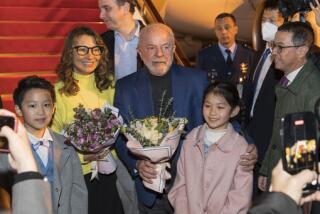Castro Looking at Reforms in China : Asia: Though skeptical of Beijing’s pragmatic approach, the Cuban leader is to visit booming special economic zones.
- Share via
BEIJING — Cuban leader Fidel Castro, in his olive military dress uniform, wrapped both arms around Chinese President Jiang Zemin on Thursday and kissed him three times, launching a visit that shows socialist solidarity--and curiosity about China’s movement from Marxism to the market.
But the Cuban president says he is not eager to embrace China’s pragmatic approach to economic development, which he thinks was implemented at the expense of Communist ideals.
Castro’s visit coincides with a tour by Vietnamese Communist Party General Secretary Do Muoi of this, the largest, and one of the last, bastions of communism. All that was missing to complete the picture of the world’s remaining major Communist leaders was Castro’s trademark cigar--he has given up smoking--and reclusive North Korean leader Kim Jong Il.
Muoi and Castro met separately with Chinese leaders, causing scrambling workers in Tian An Men Square to replace Vietnamese flags with Cuban banners in time for Castro’s arrival. But after their tours of China’s booming special economic zones, Castro and Muoi will reunite next week in Vietnam to discuss how to balance old ideology with today’s economic reality.
They’ll have a lot to talk about. China’s double-digit growth, achieved after jettisoning many of the Marxist strictures that Cuba clings to, has brought tremendous development but also resulted in unwelcome corruption and inflation. During his 10-day visit, which includes the tour of China’s special economic zones and inspection of state-run factories, Castro wants to learn “what are the mistakes--and certainly there are many,” said Cuba’s ambassador to China, Jose Guerra.
Cutting a familiar figure in his army uniform and graying beard, Castro reviewed Chinese troops at the Great Hall of the People, saluted a young girl bearing flowers, then patted her cheek. In a three-hour meeting of a dozen officials from each country, China and Cuba signed agreements giving Cuba more than $11 million in grants and loans.
Most significantly, the two countries changed the basis of their trade from barter to cash, after Cuba was not able to deliver all of the 400,000 tons of sugar it promised China in exchange for machinery last year.
*
After the meetings, China hailed Castro as a “legendary revolutionary,” and applauded Cuba for standing up to the U.S.-led trade embargo. Relations between China and Cuba have not traditionally been close, as China has been at odds with Russia, Havana’s onetime patron, throughout much of Beijing’s 46-year Communist history. But since the collapse of the Soviet Union in 1991, Cuba has looked to China--and even Vietnam, which until recently also endured a U.S. embargo--as a new source of assistance.
As Cuba suffers under the prolonged American embargo and recent crop failures, Castro is casting about for a way to inject life into the country’s economy without compromising Communist orthodoxy.
But he does show a willingness to adapt: He put on a double-breasted suit for a meeting with potential investors in New York in October, just as he wore the uniform of Communist revolutionary in Beijing.
*
In meetings with Chinese officials Thursday, Castro even echoed paramount leader Deng Xiaoping’s famous phrase to describe Havana’s economic reforms as “building socialism with Cuban characteristics.”
“We’ll continue to march forward along such a road,” Castro said.
This week, Castro literally will march. Along with tours of booming Xian and Shanghai, he plans to follow Deng’s famous tour of the south, where the Chinese leader reiterated his legendary lines of economic pragmatism: “It doesn’t matter whether the cat is black or white as long as it catches mice.”
But Castro, while absorbing the lessons of market reform, insists that for Cuba, the cat must be red. During his trip to New York for the United Nations’ 50th anniversary celebration in October, he told interviewers that he didn’t want Cuba to open up to development by the West too quickly like China and Russia had.
“The selling of my country is my greatest fear,” he said in an interview with the Hispanic network Telenoticias. He added that he would never accept reforms that would harm “the revolution and my country’s independence and sovereignty.”
More to Read
Sign up for Essential California
The most important California stories and recommendations in your inbox every morning.
You may occasionally receive promotional content from the Los Angeles Times.












